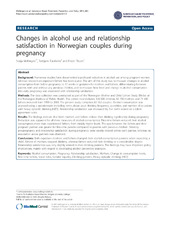Changes in alcohol use and relationship satisfaction in Norwegian couples during pregnancy
Peer reviewed, Journal article
Published version

Åpne
Permanent lenke
https://hdl.handle.net/1956/11036Utgivelsesdato
2013-01-28Metadata
Vis full innførselSamlinger
Originalversjon
Substance Abuse Treatment, Prevention, and Policy 2013, 8 https://doi.org/10.1186/1747-597x-8-5Sammendrag
Background: Numerous studies have documented a profound reduction in alcohol use among pregnant women, whereas research on expectant fathers has been scarce. The aim of this study was to measure changes in alcohol consumption from before pregnancy to 17 weeks in gestation for mothers and fathers, differentiating between parents with and without any previous children, and to measure how level and change in alcohol consumption into early pregnancy was associated with relationship satisfaction. Methods: The data collection was conducted as part of the Norwegian Mother and Child Cohort Study (MoBa) at the Norwegian Institute of Public Health. This cohort now includes 108 000 children, 90 700 mothers and 71 500 fathers recruited from 1999 to 2008. The present study comprises 82 362 couples. Alcohol consumption was assessed using a questionnaire including items about usual drinking frequency, quantities, and number of occasions with heavy episodic drinking (HED). Relationship satisfaction was measured by five items scored on a Likert agreement scale. Results: The findings indicate that both mothers and fathers reduce their drinking significantly during pregnancy. Reduction was apparent for all three measures of alcohol consumption. First-time fathers reduced their alcohol consumption more than experienced fathers, from initially higher levels. The gap between the fathers and their pregnant partner was greater for first-time parents compared to parents with previous children. Drinking pre-pregnancy and relationship satisfaction during pregnancy were weakly related within each partner, whereas no association across partners was observed. Conclusions: Both expectant mothers and fathers changed their alcohol consumption patterns when expecting a child. Almost all mothers stopped drinking, whereas fathers reduced their drinking to a considerable degree. Relationship satisfaction was only slightly related to their drinking patterns. The findings may have important policy implications, mainly with regard to developing alcohol preventive strategies.
